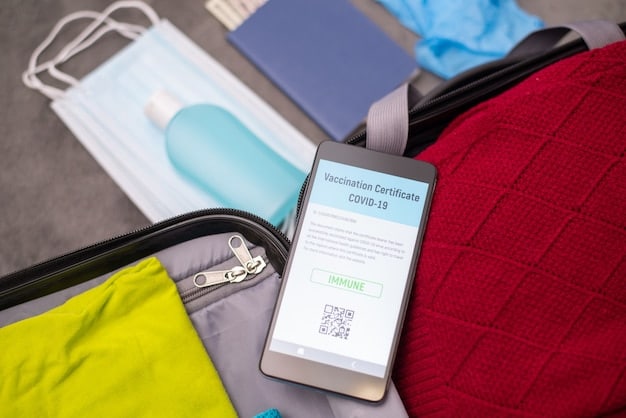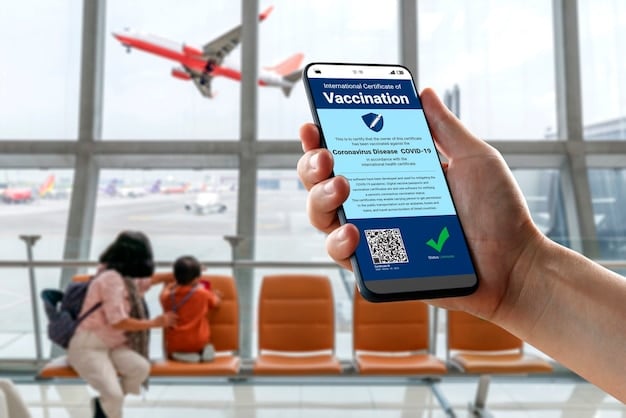Updated Travel Restrictions: Your Guide to Booking Safe Trips

Updated travel restrictions are continuously evolving, making it essential for travelers to stay informed about the latest guidelines, testing requirements, and safety measures to ensure a smooth and safe journey when booking their next trip.
Planning a trip can be exciting, but navigating the ever-changing landscape of updated travel restrictions can quickly turn that excitement into stress. Staying informed is crucial for a smooth and safe journey.
Understanding the Current Global Travel Landscape
The global travel landscape has transformed significantly in recent years. Understanding the current state of affairs is the first step in planning any trip. The situation can vary widely from country to country and even region to region.
Keeping up with these changes requires travelers to be proactive and resourceful.

Key Factors Influencing Travel Restrictions
Several factors contribute to the implementation and adjustment of travel restrictions:
- Public Health Concerns: This remains the primary driver. New variants of viruses or outbreaks of other diseases can lead to sudden changes in travel policies.
- Vaccination Rates: Countries with higher vaccination rates may have more relaxed entry requirements for vaccinated travelers.
- Reciprocity Agreements: Some nations establish agreements to mutually recognize vaccination certificates or testing protocols.
- Geopolitical Stability: Political unrest or conflicts in certain regions can lead to travel advisories or outright bans.
It is important to consider these factors when planning your trip.
In conclusion, staying informed about the current global travel landscape helps travelers plan their trips more effectively and safely, equipping them with the knowledge to navigate the complexities of updated restrictions.
Navigating Government Travel Advisories
Government travel advisories are an essential resource for travelers. They provide crucial information about safety and security conditions in different countries. These advisories can help you make informed decisions about your travel plans.
Understanding how to interpret and use these advisories is paramount.
How to Find and Interpret Travel Advisories
Most governments have dedicated websites that provide travel advisories for their citizens. Look for official sources, such as the U.S. Department of State or similar agencies in other countries.
The advisories typically use a tiered system to indicate the level of risk:
- Level 1 (Exercise Normal Precautions): This is the lowest level, indicating that the country is generally safe, but travelers should still be aware of their surroundings.
- Level 2 (Exercise Increased Caution): This level suggests that there are some risks to consider, such as petty crime or specific security concerns.
- Level 3 (Reconsider Travel): This indicates more serious risks, such as a higher risk of crime or political instability.
- Level 4 (Do Not Travel): This is the highest level, advising citizens not to travel to the country due to extreme safety and security risks.
It’s essential to read the full advisory to understand the specific risks and recommendations.
In essence, understanding government travel advisories ensures travelers are well-informed, enabling them to make safe and responsible decisions when planning international trips, thereby minimizing potential risks.
Understanding Testing and Vaccination Requirements
Testing and vaccination requirements have become integral to international travel. These requirements vary widely depending on the destination and can change with little notice. Staying abreast of these rules is essential for avoiding disruptions to your travel plans.
Knowing what tests are accepted and what vaccines are required is of utmost importance.

Types of Accepted Tests and Vaccines
Different countries may accept different types of COVID-19 tests. PCR tests are generally considered the gold standard, but some countries also accept rapid antigen tests.
Vaccination requirements also vary. Some countries require specific vaccines, while others may recognize a broader range of vaccines approved by international health organizations.
- PCR Tests: These are typically required within a specific timeframe before departure.
- Rapid Antigen Tests: Some countries accept these for entry, often with a shorter validity period.
- Vaccination Certificates: Digital or paper certificates are usually required as proof of vaccination.
Double-check the specific requirements of your destination to ensure compliance.
In summary, a clear understanding of testing and vaccination requirements and the accepted types ensures travelers can prepare adequately, avoiding travel disruptions and complying with international health standards, which contributes to safer and smoother journeys.
Travel Insurance and Health Coverage
Travel insurance and health coverage are vital for international trips. Unexpected events such as illness, injury, or travel disruptions can occur, and having the right insurance can provide financial protection and peace of mind. It’s important to choose a policy that meets your specific needs.
Consider the scope of coverage and policy exclusions carefully.
What to Look for in a Travel Insurance Policy
When selecting a travel insurance policy, consider the following:
- Medical Coverage: Ensure the policy covers medical expenses, including hospitalization, doctor visits, and emergency medical evacuation.
- Trip Cancellation/Interruption: This can protect you if you need to cancel or cut short your trip due to unforeseen circumstances.
- Baggage Loss/Delay: This covers losses or delays in your baggage.
- COVID-19 Coverage: Check if the policy includes coverage for COVID-19-related issues, such as cancellation due to illness or quarantine requirements.
Also, be aware of any exclusions, such as pre-existing medical conditions or participation in high-risk activities.
In essence, adequate travel insurance and health coverage protect travelers from unexpected financial burdens due to medical emergencies or travel disruptions, providing security and peace of mind throughout their journey.
Booking Flights and Accommodation
Booking flights and accommodation requires careful consideration, especially with **updated travel restrictions** in play. Flexibility should be a key consideration during the booking process. Look for options that allow for changes or cancellations without hefty fees.
Consider booking directly with airlines and hotels, as it may offer more flexibility.
Tips for Flexible Booking
Follow these tips to ensure a flexible and stress-free booking experience:
Book airlines and hotels that allow changes and cancellations:
- Check Cancellation Policies: Before booking, carefully review the cancellation policies of airlines and hotels.
- Consider Travel Agents: Travel agents can help you find flexible booking options and navigate **updated travel restrictions**.
- Read Reviews: Check online reviews to see how airlines and hotels have handled cancellations and changes during the pandemic.
Flexibility is critical when unforeseen conditions arise.
In summary, being strategic when booking flights and accommodation, with a keen eye on flexibility and customer-friendly policies, empowers travelers to adapt to unforeseen circumstances, ensuring smoother and less stressful travel experiences.
Staying Updated During Your Trip
Staying updated during your trip is crucial for managing any unexpected changes or new regulations. Travel plans can be affected by unexpected events. Make sure that you have access to reliable information sources.
This will help you navigate any challenges that may arise.
Reliable Sources of Information
Refer to these reliable sources for the latest updates:
- Government Websites: Check the official websites of the countries you are visiting for the most accurate information.
- Travel Apps: Use travel apps that provide real-time updates on flight status, travel advisories, and border closures.
- Local News: Keep an eye on local news outlets for any developments that may affect your trip.
Staying alert can prevent inconveniences.
In conclusion, by consistently staying updated throughout their trips—leveraging credible sources, registering with relevant services, and maintaining communication with local authorities—travelers can proactively manage changes, ensuring safer and more adaptable travel experiences.
Preparing for Potential Disruptions
Preparing for potential disruptions is a key aspect of modern travel. Flight delays, cancellations, and unexpected border closures can happen. Having contingency plans in place can help minimize the impact these disruptions have on your trip.
You can make a stressful time significantly more manageable.
Essential Preparations for Travel Disruptions
Here are some essential preparations for dealing with travel disruptions:
Know how to handle disruptions:
- Pack Essential Items: Carry essential items in your carry-on luggage, in case your checked baggage is delayed or lost.
- Keep Important Documents Handy: Keep copies of your passport, visa, and other important documents in a safe and accessible place.
- Know Your Rights: Familiarize yourself with your rights as a passenger, including compensation for flight delays or cancellations.
Being prepared can make you more resilient when you face disruptions.
| Key Point | Brief Description |
|---|---|
| 🛂 Check Restrictions | Always check the latest government travel advisories before booking. |
| 💉 Verify Requirements | Ensure you meet all testing and vaccination requirements for your destination. |
| 🛡️ Buy Insurance | Purchase comprehensive travel insurance that covers medical and trip disruptions. |
| 📅 Stay Updated | Monitor travel advisories and local news during your trip for any changes. |
FAQ
▼
Common restrictions include vaccination requirements, pre-departure testing, mask mandates, and quarantine periods upon arrival. Some countries also have restrictions based on your country of origin.
▼
Travel restrictions can change frequently, sometimes with little notice. Updates depend on the global health situation and policies implemented by individual countries, so daily checks are advised.
▼
Some travel insurance policies offer coverage for COVID-19 related issues, such as trip cancellations due to illness or quarantine requirements. It is important to check the specifics of your policy.
▼
Check official government websites such as the U.S. Department of State for U.S. citizens. Additionally, reputable travel apps and news sources can provide updates on travel advisories.
▼
Contact your airline or travel provider immediately to rebook your flight or request a refund. Check your travel insurance policy to see if it covers flight cancellations due to travel restrictions.
Conclusion
Staying informed about updated travel restrictions is essential for ensuring smooth and safe journeys in an ever-changing environment. By following the guidelines outlined in this article, travelers can confidently plan their trips, knowing they are well-prepared for any challenges that may arise.





